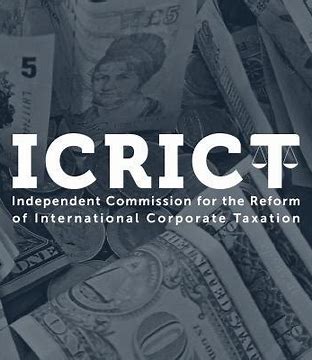Fresh Ideas Emerge for New EU Budget Levies

Cross-Border Taxation in a World of Abundant Capital
The tax rules for foreign investors in the U.S. provide highly favorable treatment, with most foreign investors paying no U.S. tax on passive investments. These rules are based on the outdated assumption that the U.S. needs foreign capital to bridge the gap between domestic savings and investment. However, global financial capital is abundant due to regressive policies abroad, leading to excess foreign savings that have fueled unproductive consumption in the U.S., contributing to financial instability and a growing trade deficit. The article advocates for reforming U.S. inbound tax rules by increasing taxes on foreign investment to address these issues.

International Compliance Assurance Programme (ICAP) Outcome Letter Template
The OECD published this template that countries can use when delivering a risk assessment of a company’s transfer pricing position. The template is part of the OECD’s International Compliance Assurance Program, a voluntary program started in 2018 that multinational corporations can use to assess the risk of their transfer pricing positions with tax administrations.

The Future of European Competitiveness – A Competitiveness Strategy for Europe
Former European Central Bank President Mario Draghi addressed tax policy in his long-awaited report on the future of EU competitiveness. Draghi's suggestions include lowering and leveling energy taxation and using taxation measures strategically to reduce the cost of energy; introducing research and development tax incentives for fabless manufacturers active in chip design and foundries in selected strategic segments; and promoting a coordinated reduction of taxation on the labor income of low- to middle-income workers.

The Subject to Tax Rule: A Comparison of The OECD and UN Versions
In this report, ICRICT argues that the UN subject-to-tax rule (STTR) is much more beneficial for countries than the OECD STTR, particularly for developing countries, both in terms of administration and potential additional revenue collection. ICRICT therefore recommends that developing countries introduce the UN STTR in their tax treaties.

Tokenization: Unlocking Developing Countries Wealth
This article highlights the significant growth of the black or shadow economy, especially in developing and least developed countries (LDCs), as identified by surveys from organizations like the World Bank, IMF, and ADB. Illicit financial flows, as noted by sources such as the Financial Secrecy Index and Tax Justice Network, have severely impacted government tax revenue. In response, governments are exploring innovative solutions, including cryptocurrencies, blockchain, artificial intelligence, and e-commerce, to address these challenges. The article also introduces the FDI return index to assess the economic performance of select developing and LDC countries. Foreign direct investment (FDI) is emphasized as a vital driver of macroeconomic development, fostering prosperity, sustainable growth, employment, and infrastructure improvements in these nations. By attracting FDI, countries can access external resources and expertise, bolstering their industries and global competitiveness.

FTC Proposals, Part II: TCJA White Paper
This paper continues the analysis from Part I of potential statutory changes to the foreign tax credit rules to improve their operation. A background and summary of the current FTC rules are provided in Part I. This paper addresses the FTC limitation under section 904, the carryover of excess FTCs under section 904(c), and the expense allocation rules.

An Investigation of the Array of Domestic and Foreign Tax Haven Location Decisions for U.S. Multinational Firms
This study investigates U.S. multinational firms’ relative use of foreign and/or U.S. domestic tax havens (i.e., Delaware) and the determinants of these choices. The authors find that a surprisingly high percentage of U.S. multinationals (around 25 percent) choose to utilize only domestic tax havens and that state tax planning opportunities are the most important driver of this choice. The authors also find that greater financial constraints, lower income mobility, and more frequent foreign losses increase firms’ propensity to use domestic tax havens. Finally, the authors provide evidence on how the array and determinants of foreign and domestic tax havens changed following the Tax Cuts and Jobs Act of 2017 (TCJA). The authors find some weak evidence that firms increased their use of domestic tax havens after TCJA, but very little change in the determinants of firms’ tax haven choices in the post-TCJA period.

Why the U.N. Must Put AI and Data on the Tax Agenda
This article argues that the United Nations ad hoc committee on international tax cooperation should focus on the structural aspects of artificial intelligence (AI) to create a more inclusive, equitable, and effective global tax system. The complexities of the AI-driven economy, such as issues related to data, intellectual property, and the fragmentation of the AI value chain, must be addressed in their work.

International Tax Scholarship and International Tax Activism
This article explores whether tax scholarship can be separated from tax activism by identifying the technical and political elements of international tax policy. It examines the appropriate roles of legal scholarship, economics, political science, and political philosophy in shaping the international tax debate.

FTC Proposals, Part I: Creditable Foreign Taxes
This paper addresses the definition of a foreign income tax, including an in-lieu-of tax, for which a credit is allowable; the interaction of the FTC with U.S. income tax treaties; the extent of the relief granted by the credit; the creditability of certain foreign income taxes related to tested losses as determined under the section 951A global intangible low-taxed income rules; the treatment of foreign tax redeterminations under section 905; the statute of limitations for matters concerning the decision to deduct or credit a foreign income tax; and the so-called FTC splitter rules under section 909.


































